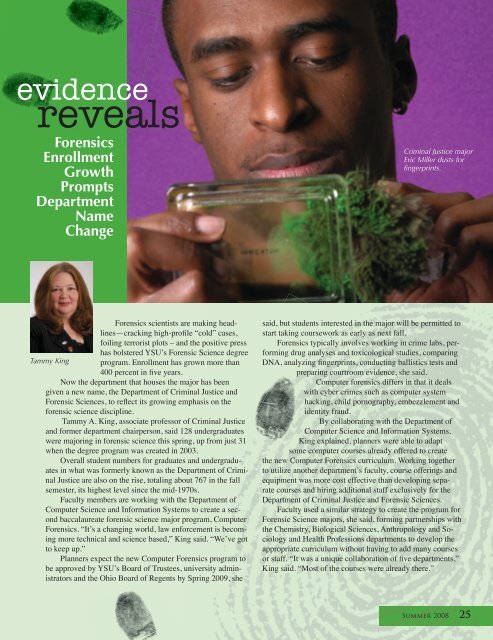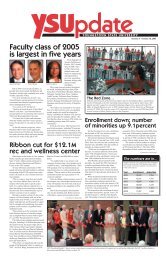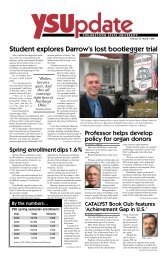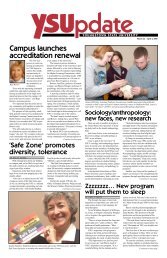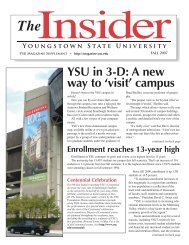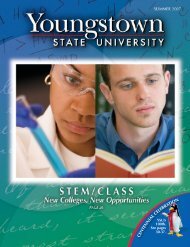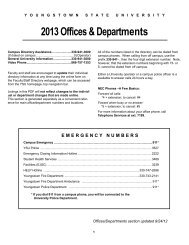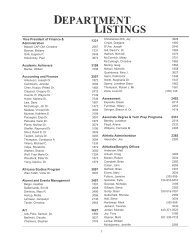Proud - Youngstown State University
Proud - Youngstown State University
Proud - Youngstown State University
You also want an ePaper? Increase the reach of your titles
YUMPU automatically turns print PDFs into web optimized ePapers that Google loves.
evidence<br />
reveals<br />
Forensics<br />
Enrollment<br />
Growth<br />
Prompts<br />
Department<br />
Name<br />
Change<br />
Criminal Justice major<br />
Eric Miller dusts for<br />
fingerprints.<br />
Forensics scientists are making headlines—cracking<br />
high-profile “cold” cases,<br />
foiling terrorist plots – and the positive press<br />
has bolstered YSU’s Forensic Science degree<br />
Tammy King program. Enrollment has grown more than<br />
400 percent in five years.<br />
Now the department that houses the major has been<br />
given a new name, the Department of Criminal Justice and<br />
Forensic Sciences, to reflect its growing emphasis on the<br />
forensic science discipline.<br />
Tammy A. King, associate professor of Criminal Justice<br />
and former department chairperson, said 128 undergraduates duates<br />
were majoring in forensic science this spring, up from just 31<br />
when the degree program was created in 2003.<br />
Overall student numbers for graduates and undergraduates<br />
in what was formerly known as the Department of Criminal<br />
Justice are also on the rise, totaling about 767 in the fall<br />
semester, its highest level since the mid-1970s.<br />
Faculty members are working with the Department of<br />
Computer Science and Information Systems to create a second<br />
baccalaureate forensic science major program, Computer<br />
Forensics. “It’s a changing world, law enforcement is becoming<br />
more technical and science based,” King said. “We’ve got<br />
to keep up.”<br />
Planners expect the new Computer Forensics program to<br />
be approved by YSU’s Board of Trustees, university administrators<br />
and the Ohio Board of Regents by Spring 2009, she<br />
said, but students interested in the major will be permitted to<br />
start taking coursework as early as next fall.<br />
Forensics typically involves working in crime labs, performing<br />
drug analyses and toxicological studies, comparing<br />
DNA, analyzing fingerprints, conducting ballistics tests and<br />
preparing courtroom evidence, she said.<br />
Computer forensics differs in that it deals<br />
with cyber crimes such as computer system<br />
hacking, child pornography, embezzlement and<br />
identity fraud.<br />
By collaborating with the Department of<br />
Computer Science and Information Systems,<br />
King explained, planners were able to adapt<br />
some computer courses already offered to create<br />
the new Computer Forensics curriculum. Working together<br />
to utilize another department’s faculty, course offerings and<br />
equipment was more cost effective than developing separate<br />
courses and hiring additional staff exclusively for the<br />
Department of Criminal Justice and Forensic Sciences.<br />
Faculty used a similar strategy to create the program for<br />
Forensic Science majors, she said, forming partnerships with<br />
the Chemistry, Biological Sciences, Anthropology and Sociology<br />
and Health Professions departments to develop the<br />
appropriate curriculum without having to add many courses<br />
or staff. “It was a unique collaboration of five departments,”<br />
King said. “Most of the courses were already there.”<br />
Summer 2008 25


